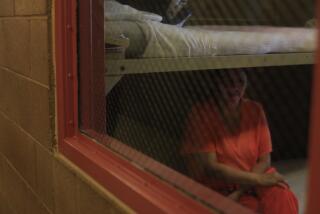Medical staff keep tabs on some California inmates who refuse food
SACRAMENTO -- Ten inmates who began refusing meals July 1 are under medical observation, prison officials said Tuesday.
The inmates are incarcerated at High Desert State Prison near the Nevada border in northeast California.
J. Clark Kelso, the federal receiver who oversees prison healthcare, said the inmates would be referred to a physician if they go 17 days without food or show signs of distress.
The 10 inmates stopped eating their regularly scheduled meals one week before the protest spread throughout the prison system Monday.
Officials said 30,000 inmates in two-thirds of the state’s prisons and four out-of-state facilities have refused meals. Hunger strikes are not recognized until inmates refuse nine consecutive meals, officials said.
Inmates at High Desert issued a hand-written letter spelling out their demands for improved prison conditions. They’re seeking cleaner facilities, better food and more access to the prison library.
More demands have been issued at Pelican Bay State Prison near the Oregon border and one of four prisons with a secure housing unit. Inmates want a five-year limit on solitary confinement and better conditions.
ALSO:
Officials say 30,000 inmates refuse meals
Hunger strikes give inmates huge platform for protests
Challenges mount for California prisons as inmates refuse meals
Twitter: @chrismegerian
More to Read
Sign up for Essential California
The most important California stories and recommendations in your inbox every morning.
You may occasionally receive promotional content from the Los Angeles Times.












